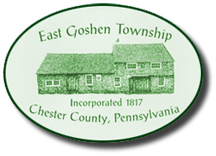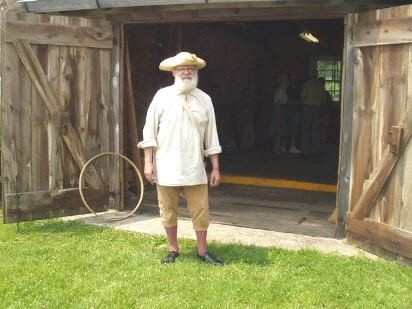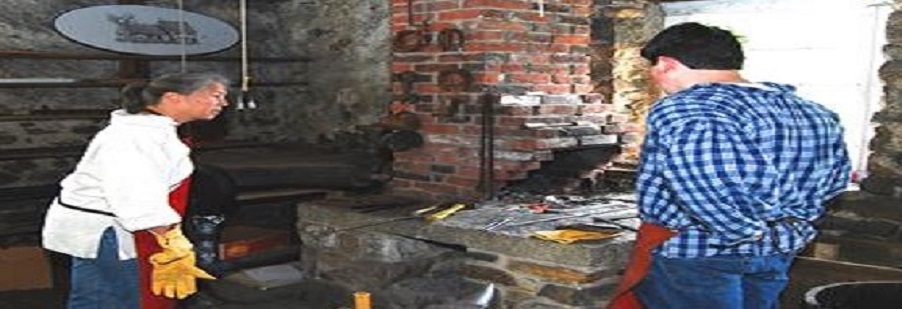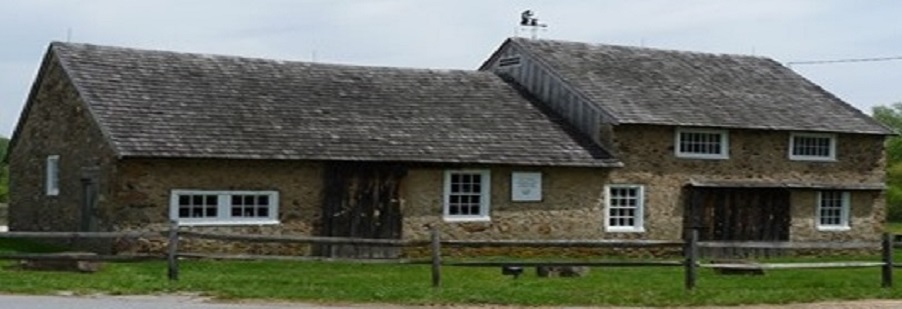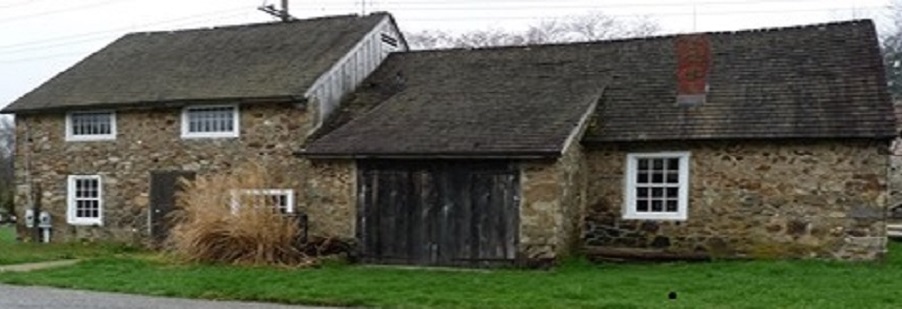Goshenville Blacksmith Shop
In the 1700s a blacksmith shop was essential to every village. It was a gathering place for farmers and other residents where they could exchange news and catch up on local gossip while the smithy shod their horses or the wheelwright repaired their wagons.
The Goshenville Blacksmith Shop was built in 1740 by Arron Ashbridge (1712 – 1776) for rental as a wheelwright shop. The hearth room section was built first. Around 1750 Aaron’s son Joshua completed his apprenticeship at the Willistown Forge and opened his own blacksmithing business in this shop. At that time a one and half story addition was erected on the south side of the original building to house the wheelwright shop. Around 1800 the addition was reconstructed with a full second floor to be used as a room for painting wagons and carriages. Sometime in the 1800s the field stone building was covered with stucco (patches of the original stucco remain). It is interesting to point out that iron ore is mixed in with the field stones in the walls of the building.
The blacksmith shop opened at daybreak, with horses waiting to be shod. The work often continued after sunset. In addition to horse shoeing, the blacksmith along with the wheelwright, repaired single and double trees for wagons, tightened and re-rimmed wagon wheels, built new hay wagon bodies on farmers running gear. The smith would also repair and sharpen farm tools, replaced wooden handles on shovels and forks and make fireplace andirons and household and farm tools. Often broken tools required welding by heating the parts in the forge then hammering the pieces together at the anvil.
The Blacksmiths who worked in the Goshenville shop included: the original Joshua Ashbridge in 1750, James Garrett (1806), William Hagenbottom (1844), Lewis Farra (1860), Edward Dougherty (1886), William Sharpless (1890), Moses and James Brown (1905), and Wiebe Velde (1915). Wheelwrights included: J. Davis Ashbridge (1840) and William Delinger (1880).
The last blacksmith to work at Goshenville was Weibe Velde. He was born in Holland and his family moved to America in 1893. Like many of his predecessors, he apprenticed in John Armstrong’s Blacksmith shop in Willistown. About 1915 he purchased the business of Moses Brown. Mr. Velde continued working at the Goshenville shop until around 1948 when increased car traffic made it impractical to bring horses to the shop for shoeing. He closed the shop and began towing a portable forge from farm to farm on a two-wheel cart behind his Studebaker. Uncle Wiebe, as he was affectionately called by his friends and neighbors, died in 1960. After its closure around 1948, the Goshenville shop fell into disrepair. Extensive restoration of the shop was begun in 1980 when the property north and west of the two branches of the Ridley Creek were deeded to East Goshen Township by Bernard Hankin as the ground was in flood plain and could not be developed. Windows, doors, the wood shingle roof were all replaced, and the stone hearth was rebuilt. A concrete floor replaced the dirt and cinders and wooden planks from a nearby barn were used to cover the concrete in the hearth room.
In 1982 East Goshen celebrated the tri-centennial of the arrival of its first residents, Welsh Quakers, with the reopening of the renovated blacksmith and wheelwright shops. As renovation of the buildings progressed, Benson (Ben) Rohrbeck, a local historian and Revolution War reenactor envisioned a working forge in the newly restored hearth room. He guided the reconstruction of the original forge and chimney and acquired an anvil, blower and pole vise necessary to a working forge. For many years Ben demonstrated blacksmithing and explained the history and significance of the Goshenville Blacksmith Shop. On June 4th. 2016 the East Goshen Historical Commission dedicated the Blacksmith Shop to “. . . the memory of Benson Rohrbeck. The tools, knowledge, and happy memories we share in this shop exist because of Ben.”
Today East Goshen proudly uses an image of the Blacksmith shop as the official township logo.
Everyone is cordially invited to visit the Goshenville Blacksmith Shop. The shop is open for free forging demonstrations and tours from 10a.m. to 4p.m. on Wednesdays and Saturdays, April through October. The hearth room (blacksmith) side of the shop is not heated so from November through March the forge is open on the same days but only if the weather is mild.
